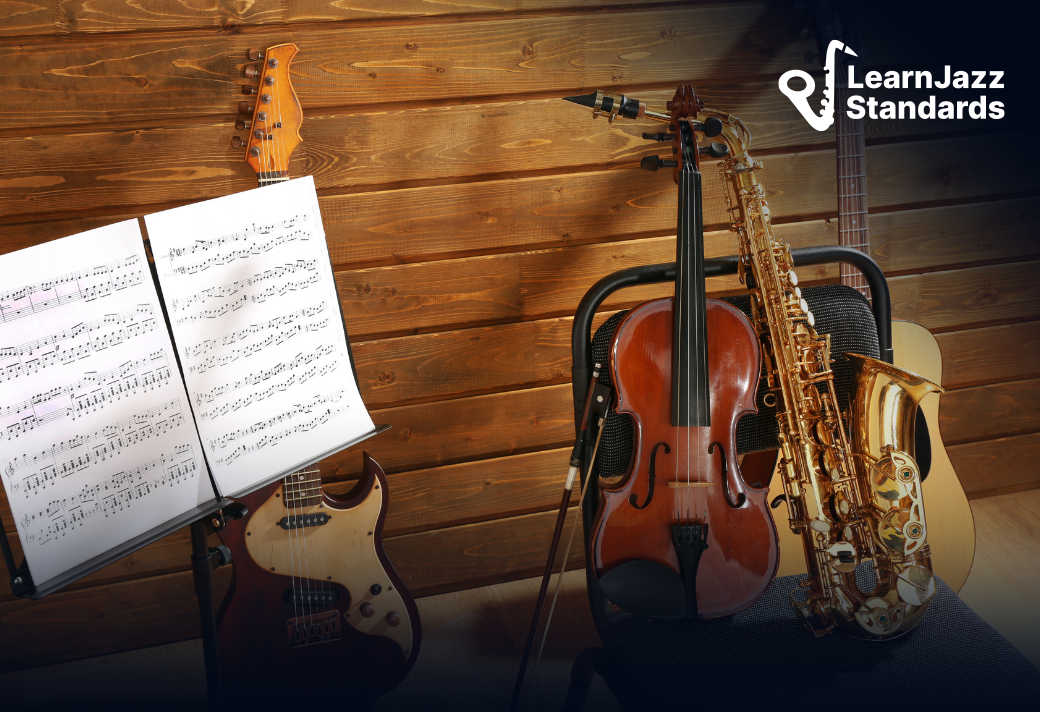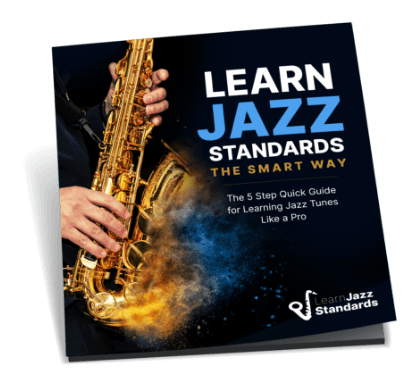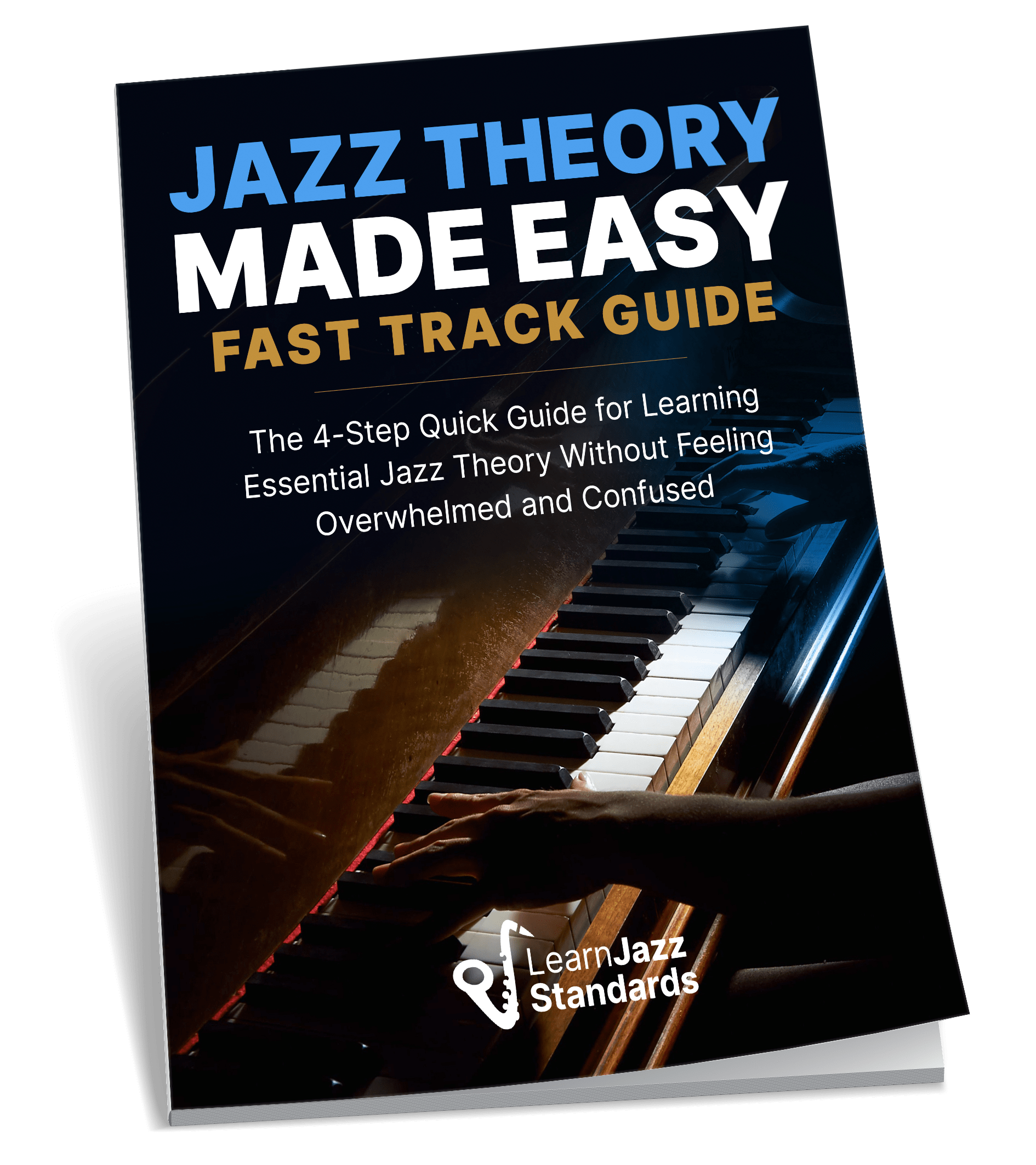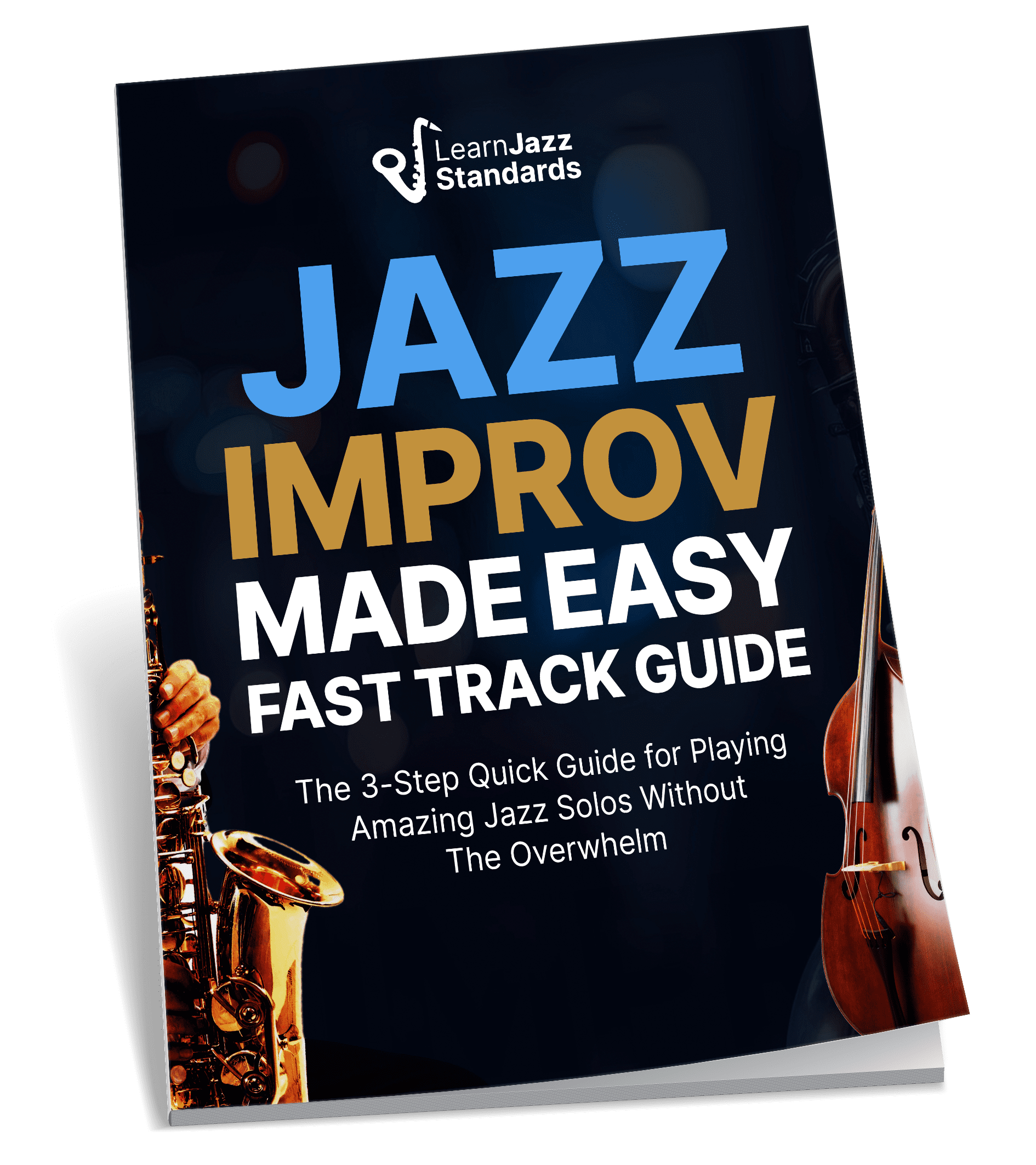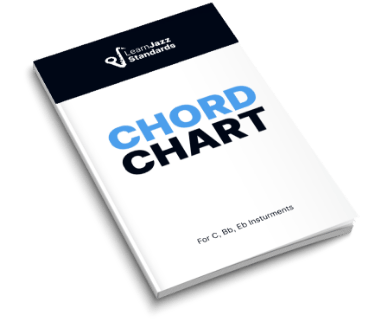Welcome to episode 107 of the LJS Podcast where today we are continuing “Jazz Standards Month” talking about composing contrafacts to develop melodic ideas. Composition and melody are huge aspects of great improvisation. Learn why, and the great benefits composing contrafacts can have. Listen in!
Listen to episode 107
One of the things that I emphasize in my upcoming eBook The Jazz Standards Playbook, is composition. That may seem odd considering the book focuses on existing compositions and lessons we can extract from them. Where does composing music come in?
You may have heard it said before that improvisation is simply composition sped up. I find this to be quite accurate. The difference between the two is one gives you time to plan and think and the other doesn’t.
So if we want to learn how to improvise better over jazz standards (which we all do), would it not be a good idea to practice composing?
Another important aspect of great improvisation is melody. The best solos out there aren’t the most technically stunning or flashy ones. They are the ones that are profoundly melodic. Those are the solos I’d rather listen to any day of the week.
In this episode, I talk about composing contrafacts. A contrafact is simply a melody that is composed over an existing set of chord changes. You can take the chords to any jazz standard and compose your own melody over it. This is a great practice and has many benefits which I expand upon in this talk.
Here are some of the things I talk about:
-
The many benefits of practicing composition.
-
The importance of melody and how to utilize it.
-
Contrafacts, what they are, and what makes up a good one.
-
Two examples of contrafacts I’ve written over “It Could Happen to You.”
-
My challenge for you this week.
I hope you’ll listen to this episode and decide to take massive, determined action. Maybe if you’re feeling so inspired, post a video recording of a contrafact you compose this week in the comments section below.
Important Links
Learn Jazz Standards Community Facebook Group[vc_separator]
Free Guide to learn standards by ear: Learn Jazz Standards the Smart Way
Read the Transcript
Brent: Oh yeah, that’s right. My name is Brent. I am the jazz musician behind the website LearnJazzStandards.com, which is a blog and a podcast all geared towards helping you become a better jazz musician. Man, I love podcast recording day, I love doing this show. It’s so much fun for me, so I want to thank you for hanging out with me, whether you’re a regular listener or whether this is your very first time, you are welcome here. You’re in the right place. If you like jazz, if you’re a musician and you want to learn, whether you’re a beginner, intermediate, or advanced, you’re in the right place and I’m glad you’re here. So thanks for being here today.
Now, we are in the middle of Jazz Standards Month here on the LJS Podcast. In our very first episode of the month, we talked about analyzing jazz standards with Roman numerals. That was back on episode 105. Then in last week’s 106 we talked about mapping out jazz standards with guides tones, with chord tones, trying to figure out what makes up these tunes, so that we can improvise over them better. Today, I’m going to talk about composing contrafacts to help you develop melodic ideas.
As I talked about in the other episodes during this month, we’re celebrating this Jazz Standards Month, because in the month of April, we are going to be launching our brand new e-book, “The Jazz Standards Playbook”, which is a study of 10 jazz standards, an in-depth study where we go through these standards, these important standards, and get underneath them, get inside them, so that we ultimately can become better improvisers and understand how to play any jazz standard. I’m really excited about this book. We’ve been putting a ton of man-hours into making this the best possible product we can.
One of the lessons that we go over is writing contrafacts, and composition is a real big deal in this book. If you’re not a composer, don’t be intimidated, because I wouldn’t even consider myself one of those guys that’s popping out songs every single week. That’s not at all what I’m talking about here, but composition can be a very powerful tool for becoming a better improviser. I’m totally going to tell you all about that in today’s episode, how composition can really, really boost up your playing if you take the time to do it, and I’m going to have a challenge for you at the end of this episode. I’m really excited.
By the way, if you want to get notified, if you want to be one of the first people to get notified when “The Jazz Standards Playbook”, and companion course, by the way, comes out, sign up at TheJazzStandardsPlaybook.com. Okay? TheJazzStandardsPlaybook.com. Sign up there, you’ll be the first one to get notified when this comes out. So I hope you do that.
Okay, right now, right before we go into today’s show, I want to tease you with something. Is that okay? I’m going to tease you with something here. I have a very special invitation for you podcast listeners that I want to invite you into. I’m really excited about this. This is brand new, and I want to invite you to be a part of this thing. I’m not going to tell you what it is. I’m going to tell you at the very end of this episode, so stay tuned for that. I have something very special, and it’s completely free, absolutely free, just like 95, maybe 98% of everything on Learn Jazz Standards anyways, but I want to invite you to come into this thing, but I’m going to tell you about it at the end of the show. So just keep that in the back of your mind, but for now, let’s jump right into today’s main event.
Now, you heard me just say that composition is an emphasis in “The Jazz Standards Playbook”. Why would composition be emphasized? Well, there’s a few reasons. Let me go over the first one. The first reason is that “composition” is an action word. “Composition” is an action word. It requires you to take action. How many of you have listened to podcasts, have bought music books, have gone to jazz or music workshops, have attended a conference, have taken a course, have taken private lessons, but then you didn’t follow through, you didn’t take action? You just were there, you consumed the content, maybe it motivated you a little bit, but then you didn’t take action. Well, you missed out on the most important part, because at the end of the day, we have to take action in order to improve as musicians. I’ve said it once, I’ll say it again.
In the companion course, I’ve been recording the companion course for this book recently, and one thing I really emphasize in it is based off this Tony Robbins quote, which is, “If we want to have success, we have to take massive, determined action. If we want to be successful, we have to take massive, determined action.” And yes, this applies in music 100%. You can listen, you can read all you want, but if you don’t take action on the things that resonate with you the most, then it’s all going to be for naught. We have to take action, and “composition” is an action word. It requires us to take action.
The other reason that composition is a big emphasis here is because improvisation, improvising, which is a fundamental element of jazz, it’s almost what trademarks jazz, is that it is an improvisational music. It is based off of improvisation. Improvisation is composition sped up. Say that one more time, improvisation is composition sped up. So if we want to become great improvisers, which I know that we all do, because I get emails from you guys all the time. I’ve been around doing this for a while. I know that every one of you, including myself, wants to become a better improviser. If we want to become better improvisers, how do we do it? Well, if improvisation is composition sped up, then why would we not practice composing a little more? Why don’t we start with the slow parts?
You ever heard someone say, you know, you’re trying to play a really fast passage and someone says, “Hey, hey, hey, hey, hey, slow down. Practice playing it slow first and then build up the speed so you can go quicker”? Why don’t we do the same thing with improvisation? Why don’t we practice composing stuff the way that we would want to play ultimately, so that we can eventually work our way up to improvising better? So composition is important. It’s the foundation of improvisation.
Now again, like I said earlier, composition doesn’t mean that you have to be writing all these tunes, like original music, all this stuff. One thing that I’ve done, that I’ve really focused in on in my music career over the last several year of my life has been creating books, yes, like these e-books that I’ve done for Learn Jazz Standards, but I’ve also written a couple books now for the music publication company Hal Leonard. And what I’ve learned from doing this is that from building these books, from creating courses, I’ve become a better musician myself, because it’s forced me to sit down and analyze what I actually do to play, and it’s forced me to conceptualize ideas. It’s forced me to compose music that will help one improve, and in fact, help myself improve.
So composition, it can have a profound effect on our musicianship if we take the time. We can be composing exercises, we can be composing songs, we can be composing all sorts of different things that can help us play. Licks. There’s all kinds of ways that we can compose, not just composing original music. So I want to make that part clear right away.
Now, let’s start talking about melody really quick, the importance of melody. I got an email in my inbox the other day, and it was from a bass player, and the bass player said to me, “You know, I always hear people say that bass players need to learn how to play the melody, but no one ever says why. Tell me why do I, as a bass player, need to know how to play the melody?” And you know what? I thought that was an excellent question. That’s a really good question. I also admire this musician, because I’m also a lot like that. I need to know why. IF someone’s telling me what to do, I’m not one of those people that just kind of blindly follows. Someone has to really convince me, hey, why should I put in the time and effort to do this?
Well, melody, the melody of any song, is the core element of that song. It is the core element. What defines any song? What defines one blues from another blues? It’s the melody. You have to know the melody to get the essence of the song. And in fact, when we’re improvising, to stay true to a song, we will want to reference that melody. If we’re playing a blues, why would we just want to play … we don’t want to just be playing scales or licks over top of it, we want to be incorporating the melody into it.
The melody’s important, therefore we must know the melody. And in fact, I am guilty on many levels of playing many gigs with singers or other musicians where I had to learn songs on the gig, and now I just know the chord changes, because I’m a guitar player, but I never went out and learned the melody. And guess what? I don’t really know that song, because I don’t know the melody. I can accompany somebody, but I don’t know that song. I need to do the homework, I need to do the rest of the work.
So we have to know the melodies. Now, melody’s important, composing is important, because at the end of the day, what do we want out of our jazz improvisation? We want to make melodic solos. That’s why melody’s important. We want to create melodic solos. I would way rather … and tell me if you agree with this … I would way rather hear a musician play an incredibly melodic solo than someone just shred a crazy technical, amazing solo. Can I get an “amen”? All right, I think I just heard a bunch of you, like thousands of you in your cars on the way to work listening to this podcast, shout, “Amen.” I think you just came back through my speakers.
I would way rather hear that. Now, even those musicians that do have incredible technical prowess, that are world-class musicians … let’s just use the most classic example, John Coltrane. John Coltrane can play circles around anybody. John Coltrane can shred, but guess what? Every one of his solos is profoundly melodic. It’s profoundly melodic. So what do we want out of our jazz solos? We want them to be melody-driven. We want to be composing … I just used that “C” word … composing melodies on the spot when we’re improvising, not shredding scales, not shredding licks, not rehashing somebody else’s solo. We want to be composing on the spot. We want to speed up the composing process so that we’re composing melodies on the spot. That’s how important melody is, and that’s how important composing is.
Maybe you’re wondering right now, what does any of this have to do with contrafacts, and what is a contrafact anyways? Why don’t you just get to the point? You know, it’s funny, I get emails every once in a while, not very often, but every once in a while, from someone who’s just like, “Brent, your podcasts are too long. Just get to the point, would you?” And listen, what are these people like when they read a story or watch a movie? Do they just want, I don’t know, like a five-minute movie, like just tell us the beginning, what ends up happening and the end? When they read a book, how long are their books that they read? Anyways, not this podcast. Wrong podcast then. This podcast, we tell stories on this podcast.
So listen, contrafacts. Let’s talk about contrafacts. What is a contrafact and how does this tie into composing and creating melodic solos? A contrafact is a composition that uses chord changes to an existing song, but you write a new melody over top of it. So it’s a composition, it’s a song, that one composes over existing chord changes. The chord changes are not being composed, but the melody is. So you’re putting a new melody over top of existing chord changes, and in this case, contrafacts are really … the terminology really comes about in jazz, in jazz standards. If you’ve ever listened to any Charlie Parker tune, I mean, there’s a 75% chance … I don’t know what the percent chance is exactly, but there’s a large percentage of a chance that that tune is a contrafact. Charlie Parker, for example, he wrote a lot of rhythm changes tunes, and pretty much any rhythm changes tune that is not “I Got Rhythm” by George Gershwin is a contrafact.
So there are tons of contrafacts out there where people take chord changes of a song and write a new melody over top. That is really a tradition that has existed in jazz for a long time. So there’s your definition of a contrafact. Now, as the title of this episode suggests, I want to encourage us to compose contrafacts in order to become better jazz musicians. Why? For all the reasons I just talked about. Composition is important, it’s the slowed-down version of improvisation, and melodies are really important to develop, because we want to play melodic solos.
When we’re trying to learn a new jazz standard, we learn a jazz standard, we learn the melody of that jazz standard, we learn the chord changes, we go through that whole process of getting acquainted with that song, and now the improvisation process comes. And this is where I get the most questions about, “How do I improvise over these chord changes? I don’t know what to do?” Well, I want to suggest that we start first with melody. Start first with melody, don’t go straight to what scales do I play over this chord? Don’t go straight to … Think about for a second, what kind of melody do I want to create over this? Because melody is the most important thing.
The great way to do that … a great way to do that is composing a contrafact. Take the chord changes to the jazz standard you just learned, and compose your own melody over top of it. Now, this is not a solo. I want to be very clear. We’re not composing a solo over top, that’s a different practice altogether. We’re composing a melody. We’re composing a new song, and by doing this we’re practicing taking the knowledge that we know currently about composing, about melody, about jazz language or any kind of musical language, and we’re putting it into practice. We’re putting down what we know. We are solidifying what we know of how to make a solid melody, and that is the benefit of composing contrafacts when learning jazz standards and wanting to improvise over them better.
I do get this question from time to time: “I’m starting from square one, Brent, I really don’t know where to start. How do I compose a melody?” Whenever anybody asks me that, I simply ask them to start listening to some of their favorite songs. It doesn’t have to be jazz. In fact, I think The Beatles is a great example. Listen to Beatles tunes, and just listen to the melody. Everybody knows melody. I mean, everybody’s been listening to music since they were a kid, different levels of exposure for everybody, but everybody’s been listening to music.
Whether you believe it or not, you know how to make melodies. Have you ever caught yourself singing in the shower? Have you ever started humming something? Have you ever been whistling something? You are making melodies. Your melodies don’t have to be world-class. They don’t have to be perfect. It just means that you have to take massive, determined action and put into practice what you already know, what’s already innately inside of you.
So never tell me that you don’t know how to compose melodies. You do. Just simply follow a few rules, like make there be a repeating theme to it. Every melody has to have a repeating theme. There has to be some repetition to it. Even some of those bebop melodies, they have some repetition to it. I’m going to show you an example of a bebop contrafact in just a second, but you’ll see that there’s repetition in it, and that’s what makes it different from a jazz solo. There is a repeated theme in that melody.
So when you’re composing a contrafact, and again, I’m going to show you a few different examples in a second, when you’re composing a contrafact, here’s the process. First, make sure you’ve learned the chords to the jazz standard that you’re writing a contrafact over. Know those chords inside and out, because that’s what you’re going to build the melody over. Number two, compose the melody, write the melody over top of it. Number three, perform it or record it.
Now, why perform it or record it? It’s important that you get that composition out there, whether that be at a gig that you have or, at the very least, record it, even if it’s in some kind of trivial way, basic way, like on your smartphone. Doesn’t have to be a professional recording, just some sort of way to document what you’ve done. That’s important for solidifying that you’ve completed that project and you’ve done it, and it’s here. It lives somewhere so that you can reference it at any time. That’s important to do. It’s important to document your work. So number one, learn the chords. Number two, compose the melody. Number three, perform it or record it.
I’m going to show you an example of two contrafacts that I’ve written, that I’ve composed. This is over top of the jazz standard, “It Could Happen to You”. We all know that song, “It Could Happen to You”. If you don’t, make sure you go check that one out. I wrote two different kinds of melodies over top. The first one, I very cleverly called it “It Just Happened”, is the name of my contrafact. This composition, I went into it with a very specific intention. I wanted to write a very basic melodic melody, a very melodic basic melody. In other words, I didn’t want it to be too note-y. I wanted it to be very singable, and that is a good characteristic of a great melody, it’s very singable and it has repetitions in it. So let’s listen to this. It’s called “It Just Happened”.
All right. Not bad, right? That was with a backing track, not with a live band, but you get the idea there. You heard the singability in that, and I had a lot of fun composing that, because the great thing about composing is, again, it’s a slower process than improvising. I had time to actually think about it, and in the process I was internalizing that melody by playing it over and over again and making slight adjustments to it. And I was getting the time to actually focus on hitting the really money notes in the chord changes. Not always, of course, am I outlining the chord changes, like a bebop solo or something like that. I’m just trying to find those important notes that I wanted to outline in my melody that were going to make the real big difference. I love that practice. I love creating contrafact. It’s such a great way to do this and to really hone in on hitting those changes or hitting those money notes and creating melody.
Okay, I’m going to play another contrafact for you, and this one is a completely different style. It is in the bebop style, meaning that it’s very eighth-note-based. There’s a lot of enclosure patterns in it. There’s a little more chromaticism in there, and it’s more like a Charlie Parker kind of a head. So I intentionally made it in this style, and I think that’s the other great thing about creating contrafacts, is that you can take different styles or different approaches to creating your melody. You can set parameters for yourself, and that was my parameter, was to create a bebop-style head in the style of Charlie Parker the best that I could. This one, it’s called … I didn’t really have a good name for it, so I just called it “Bebop Contrafact”, but it’s over the exact same chord changes to the jazz standard, “It Could Happen to You”. I did add one little change in there, and I’ll tell you about that when it’s done, but here it is. This is “Bebop Contrafact”.
Okay, so that was “Bebop Contrafact”. Now, it’s in the style, like I said, of Charlie Parker’s bebop heads, and you know, when you listen to Charlie Parker heads, really it sounds like he’s just taking a solo, but here’s the big difference: there’s a theme involved. Like I said, there’s a theme, there’s a strong theme that repeats itself, A section to A section, and you heard that indeed happen in my contrafact as well. That’s important, because if you think about it, another element of a great melody or a great melodic solo is a theme. In our solos as well, there should be a theme, and you know, we’re all guilty of there not always being a theme, but if you can add that story-like element of theme into your solos, that’s awesome. So this is a great way, taking a bebop-style head. It’s a great way to kind of get a little closer to a solo, but still add that melodic compositional aspect to it. So that’s the “Bebop Contrafact”. That’s the example of that kind of a composition that you could do as well.
Okay, so you’ve heard some ideas, you’ve heard me preach about the importance of composition and creating melodies. You should know how to do this, so can you imagine what I might possibly be challenging you to do this week? I’ll give you a second to think about it. That’s right, I’m going to ask you to compose a contrafact over a jazz standard you know. It doesn’t have to be “It Could Happen to You”, but any jazz standard that you feel really confident in knowing the changes to. My challenge for you this week is to compose your own contrafact over that song. And the benefits that you will get from this, I think you will find very apparent. I don’t teach very many private students these days, because unfortunately, I am just way too busy, but of the students that I do have, every single time I ask them to compose anything, they come out on the other side thanking me that I asked them to do that, because it’s always so beneficial.
So I want to challenge you to do that. Now, by a raise of hands, raise your hand if you are going to compose a contrafact this week. I just imagined in my head like someone’s at the gym right now listening to this podcast, and they raise their hand, and everybody’s looking at them like, “What are you doing right now?” I think I’m having a little too much fun with this podcast this week. Okay, but seriously, who’s going to do this this week? I want you to take up this challenge, write a contrafact over a jazz standard you know. You’re going to be thanking me for it, I promise you. Go out and do it. That’s your challenge this week.
All right, that’s all for today’s show. Thank you so much for listening. Remember to take action, and listen, I really appreciate you guys for listening, for hanging out, and it’s really my honor, it’s my privilege to be able to serve you week after week, so I always don’t feel like I say it enough. Thank you so much for listening, for being a part of this.
Now remember, if you want to be on the early list to be the first to be notified when “The Jazz Standards Playbook” e-book and companion course comes out in April, I want to invite you to go to TheJazzStandardsPlaybook.com and sign up there. Man, we have lots of people signing up for this. You’re hungry for this book, and I’m excited for it, because I’m really excited to serve you further with this book. So sign up there, TheJazzStandardsPlaybook.com.
I did not forget my little tease at the beginning of the show. I told you earlier, I want to invite you into something that I’m really excited about, and I’m really pumped up about, and that is our very brand new Learn Jazz Standards Community Facebook group. We launched this just the other week, and we already have over 1,000 members in this group. I’m telling you, we’re already having such amazing discussions. And I’ll tell you first of all that I’ve been thinking about doing this for actually quite a long time, but because I do Learn Jazz Standards full-time, this is my full-time job, and there’s a ton of work involved in it. On top of that, I also am an active gigging musician here in New York City, so I’m still playing gigs at night and working a lot.
And so I worried a lot about starting up this group and moderating it and all that stuff like that, but at the end of the day, I realized you know what, in order to serve you better, my jazz community here, I want you guys to meet each other, because we have tens of thousands of musicians from all over the world who are a part of our newsletter list, who are a part of our YouTube subscribers, our Facebook subscribers, our podcast listeners. I mean, you guys are all there, but I could serve you so much better by introducing you to each other. You guys can actually talk to each other. So far, there’s some great conversations going in, and the way we’re running this group is if you have a tip, use the hashtag #tip at the beginning of your post, and give someone a tip. If you have a question you want to ask the group, use hashtag #ask, and then ask your question.
So far, people are just really helping each other out, and I’m really excited. I can see this vibrant community all being surrounded by LearnJazzStandards.com, and it makes me so excited, and so I’m really excited for the future of this community group. If you want to get involved in this, if you want to join the Learn Jazz Standards Community, go to LearnJazzStandards.com/community, and that will forward you to that Facebook group. It is a closed group, so you have to request to be entered into it. Make sure you answer the questions, that lets me know that you are actually coming from this podcast, and then I will let you into the group, and I’m going to be excited to have you. So LearnJazzStandards.com/community.
All right, now next week we are going to be doing our last episode of Jazz Standards Month on this podcast, and I’m really excited about it. It’s going to be a good closing one. It is episode 108. I’ll see you back next week.



